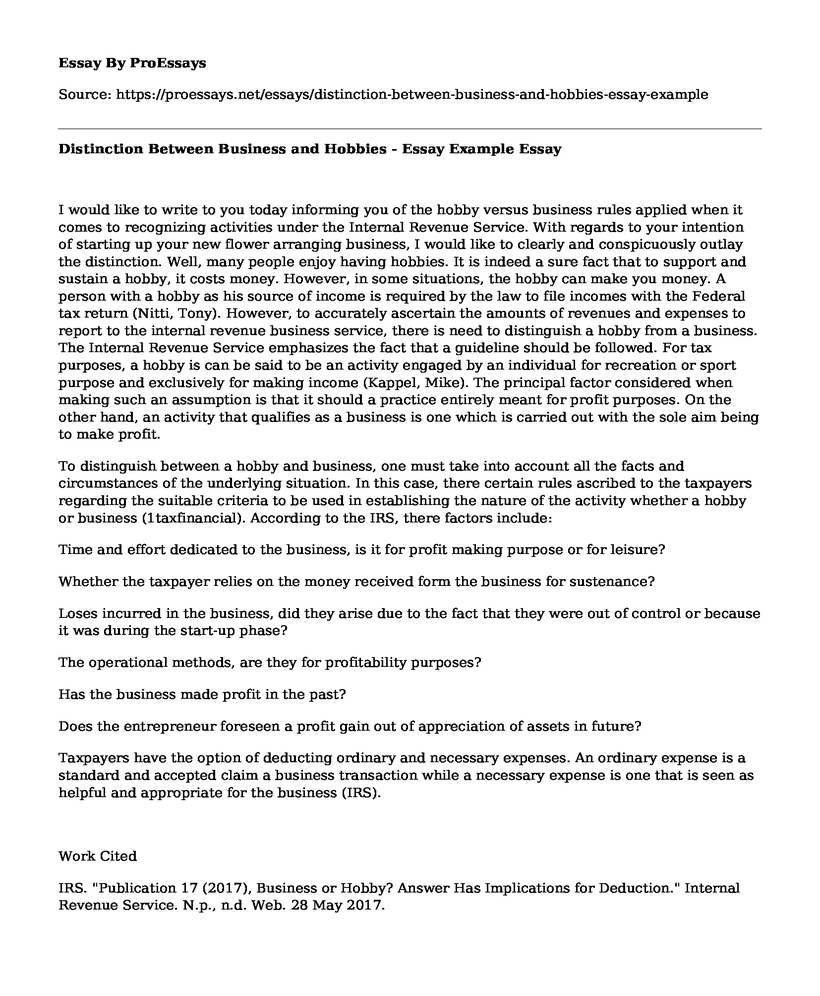I would like to write to you today informing you of the hobby versus business rules applied when it comes to recognizing activities under the Internal Revenue Service. With regards to your intention of starting up your new flower arranging business, I would like to clearly and conspicuously outlay the distinction. Well, many people enjoy having hobbies. It is indeed a sure fact that to support and sustain a hobby, it costs money. However, in some situations, the hobby can make you money. A person with a hobby as his source of income is required by the law to file incomes with the Federal tax return (Nitti, Tony). However, to accurately ascertain the amounts of revenues and expenses to report to the internal revenue business service, there is need to distinguish a hobby from a business. The Internal Revenue Service emphasizes the fact that a guideline should be followed. For tax purposes, a hobby is can be said to be an activity engaged by an individual for recreation or sport purpose and exclusively for making income (Kappel, Mike). The principal factor considered when making such an assumption is that it should a practice entirely meant for profit purposes. On the other hand, an activity that qualifies as a business is one which is carried out with the sole aim being to make profit.
To distinguish between a hobby and business, one must take into account all the facts and circumstances of the underlying situation. In this case, there certain rules ascribed to the taxpayers regarding the suitable criteria to be used in establishing the nature of the activity whether a hobby or business (1taxfinancial). According to the IRS, there factors include:
Time and effort dedicated to the business, is it for profit making purpose or for leisure?
Whether the taxpayer relies on the money received form the business for sustenance?
Loses incurred in the business, did they arise due to the fact that they were out of control or because it was during the start-up phase?
The operational methods, are they for profitability purposes?
Has the business made profit in the past?
Does the entrepreneur foreseen a profit gain out of appreciation of assets in future?
Taxpayers have the option of deducting ordinary and necessary expenses. An ordinary expense is a standard and accepted claim a business transaction while a necessary expense is one that is seen as helpful and appropriate for the business (IRS).
Work Cited
IRS. "Publication 17 (2017), Business or Hobby? Answer Has Implications for Deduction." Internal Revenue Service. N.p., n.d. Web. 28 May 2017.
Nitti, Tony. "How Not To Run A Side Business: Navigating The Hobby Loss Rules." N.p., July 2013. Web.
1taxfinancial. "Is Your Hobby a Business, or Your Business a Hobby?" 1taxfinancial. N.p., n.d. Web. 28 May 2017.
Obliviousinvestor. "Hobby Vs. Business: Avoiding the Hobby Loss Rules Oblivious Investor." Oblivious Investor Low-Maintenance Investing with Index Funds and ETFs. N.p., n.d. Web. 28 May 2017.
Kappel, Mike. "When Does A Hobby Become A Business?" N.p., Dec. 2016. Web.
Cite this page
Distinction Between Business and Hobbies - Essay Example. (2021, Jun 17). Retrieved from https://proessays.net/essays/distinction-between-business-and-hobbies-essay-example
If you are the original author of this essay and no longer wish to have it published on the ProEssays website, please click below to request its removal:
- Research Paper Example: Cloud Computing in the Hospitality Industry
- Problem Solving Using Fishbone Diagram: French Restaurant in New York City
- Move Baladna Company That Qatar Brand to UK Foreign Market
- Entrepreneurship Education in Developing Countries - Paper Example
- Essay Example on Corporate Social Responsibility: Achieving Sustainable Business Profits
- Essay Example on Unlock Your Potential: How Governments Encourage Entrepreneurship
- Essay Example on Two Articles on Entrepreneurship: Challenges and Ideas







